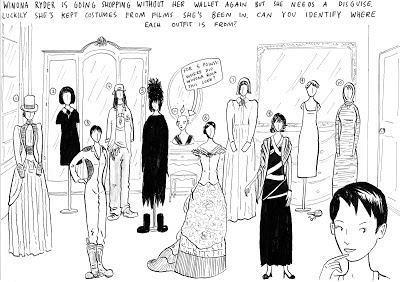Friday, 5 July 2013
'The Act of Killing' and 'Stories We Tell': review round-up
We held the sixth edition of the Hold Onto Your Butts film quiz at Dukes @ Komedia last night. As usual, I've posted Joe Blann's fantastic picture round above for your pleasure!
Reviews...
'The Act of Killing' - Dir. Joshua Oppenheimer (15)
Unsettling, bizarre, sometimes oddly amusing and always a challenging watch, documentary 'The Act of Killing' follows a group of Indonesian war criminals as they stage camp and increasingly strange re-enactments of their crimes for a feature film. These men - who carried out genocide on 1 million of the countries communists, ethnic Chinese and their families in the mid-60s, with the backing of their army and Western governments - mimic their favourite American gangster movies and incorporate pieces of Indonesian folklore in order to celebrate their part in the killing of thousands, with executioners among those proudly demonstrating the techniques they used to kill on the very locations where they committed their heinous and unpunished crimes.
What's immediately striking about the film is how frank and open the men are: from the newspaper owner (still running his paper) who declares his job was to "make the public hate communists" and to single out individuals for persecution and death, to politicians (still in power) who boast about their use of violent gangsters and uniformed militia groups to keep dissenters in-line. We witness gangsters in modern day Indonesia as they bully and extort "protection money" from frightened Chinese shopkeepers and hear one political candidate talk candidly to the camera about his plans to use his office to force local business to pay him bribes - or else he'll have their buildings condemned. It's a scale of corruption and celebration of mass murder so brazen the criminals can appear on what looks like the Indonesian equivalent of "Loose Women" to promote their film - and loudly declare that they will kill any communists who speak out against it, to the cheers of the studio audience. Unnerving in the extreme, but so heightened and seemingly exaggerated that it's hard not to laugh: for instance, when the head of a paramilitary organisation brags of his "relax and Rolex" lifestyle.
What makes the film so extraordinary and thought-provoking is that this isn't the story of a group of mad individuals, but seemingly something that runs much deeper and across the entire country. It's a reminder of many things, not least the fact that it doesn't take much to vilify a group of people and encourage a state-sponsored pogrom, but also that there's no such thing as "good" or "evil" people - that, unpalatable as it may be, most of us are capable of either in almost equal measure, guided by the hand of history as it shapes the society around us. These are men who talk of their love of dancing in the street after watching Elvis Presley movies. Men who collect crystal Tinkerbell statues and wear pink fedoras in earnest. Men who give as much thought to how to choreograph a musical number as they did to finding the most efficient ways to kill.
It's also a monument to the power of art to help people better understand themselves, to encourage empathy and as a vessel for exploring existential questions. A simple dialogue or argument with any of these men would have undoubtedly lead to a stand-off, so ingrained in their culture and past 50 years of myth-making is the rightness of their cause. But in providing them the means to make a film about their exploits - ostensibly celebrating and explaining what they did for posterity - the film demonstrates how art can lead to reflection and, in this case, unearth long-suppressed doubts. It's clear that, in the case of one executioner, re-enacting the events and re-visiting them in this way gives rise to feelings of grief and guilt that he might otherwise never have experienced - let alone expressed. It's usually pompous and empty to brand a film "important", but 'The Act of Killing' is exactly that. A near-perfect example of what can be accomplished by documentary filmmaking.
'Stories We Tell' - Dir. Sarah Polley (12A)
From Sarah Polley - the director of the uneven drama 'Take this Waltz' - comes a surprisingly affecting documentary 'Stories We Tell', in which she examines the life of her late-mother, the truth about her estranged genetic father and the way in which we construct stories. Inviting members of her extended family and friends to tell their version of events from beginning to end, Polley edits together disparate, sometimes contradictory accounts of her mother's life, to tell a nuanced tale that is equal parts sad and joyful in its depiction of a person's life and their secrets. The narration, written and delivered by Polley's (non-genetic) father, Michael, is especially poignant and even beautiful.
It's less effective, however, when Polley takes a more proactive part in events - making her own observations and reading excepts from letters with a humourlessness that's hard to stomach. Especially as she brings the focus of the film onto the making of the film itself, drawing attention to some of the techniques and advantages of its construction in a faintly self-congratulatory spirit that almost spoils things. Almost, but not quite: because 'Stories We Tell' is a fantastic piece of work, even (at times) in spite of its director. A celebration of a person's life that never shies away from the complexity of their character: a humanistic film that explores a woman's infidelity without judgement and with uncommon understanding.
Subscribe to:
Post Comments (Atom)



The most gut-wrenching 'making of' documentary of all time. Glad I watched it.
ReplyDeleteHELLO HOW ARE YOU?
ReplyDeleteI SEE YOR FLIM,